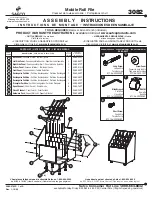
12 DePuy Synthes USS™ Low Profile Spine System Surgical Technique
Required instruments
388.870/
Trial Rod for USS Rods, length 150 or
388.880
400 mm
388.960
Bending Pliers with Rolls for USS Rods
388.910/
USS Bending Irons, left/right
388.920
Use a trial rod to determine the shape and length of the
rod to be inserted. Contour the rod using either the
bending pliers with rolls (1) or the USS Bending Irons.
Warning:
Once bent, titanium rods should not be
bent back again. Do not bend titanium rods more
than 45°.
Rod Contouring
1












































